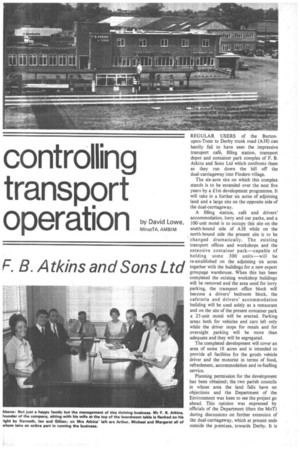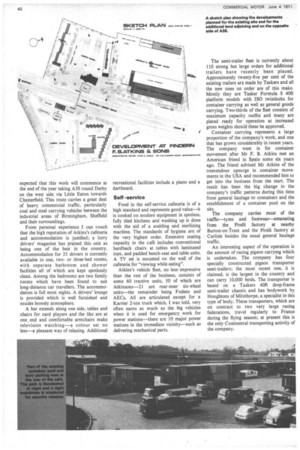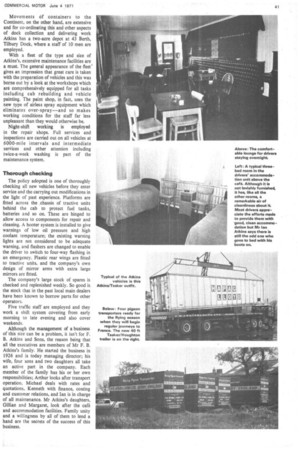Controlling transport operation
Page 41

Page 42

Page 43

If you've noticed an error in this article please click here to report it so we can fix it.
by David Lowe,
MInstTA, AMBIM
F. B. Atkins and Sons Ltd
REGULAR USERS of the Burtonupon-Trent to Derby trunk road (A38) can hardly fail to have seen the impressive transport cafe, filling station, transport depot and container park complex of F. B. Atkins and Sons Ltd which confronts them as they run down the hill off the dual-carriageway into Findern village.
The six-acre site on which this complex stands is to be extended over the next five years by a glm development programme. It will take in a further six acres of adjoining land and a large site on the opposite side of the dual-carriageway.
A filling station, cafe and drivers' accommodation, lorry and car parks, and a 100-unit motel is to occupy this site on the south-bound side of A38 while on the north-bound side the present site is to be changed dramatically. The existing transport offices and workshops and the extensive container park—capable of holding some 300 units—will be re-established on the adjoining six acres together with the buildings for a new export groupage warehouse. When this has been completed the existing workshop buildings will be removed and the area used for lorry parking, the transport office block will become a drivers' bedroom block, the cafeteria and drivers' accommodation building will be used solely as a restaurant and on the site of the present container park a 25-unit motel will be erected. Parking areas both for vehicles and cars left only while the driver stops for meals and for overnight parking will be more than adequate and they will be segregated.
The completed development will cover an area of some 18 acres and is intended to provide all facilities for the goods vehicle driver and the motorist in terms of food, refreshment, accommodation and re-fuelling service.
Planning permission for the development has been obtained; the two parish councils in whose area the land falls have no objections and the Department of the Environment was keen to see the project go ahead. This opinion was expressed by officials of the Department (then the MoT) during discussions on further extension of the dual-carriageway, which at present ends outside the premises, towards Derby. It is expected that this work will commence at the end of the year taking A38 round Derby on the west side via Little Eaton towards Chesterfield. This route carries a great deal of heavy commercial traffic, particularly coal and steel carrying vehicles between the industrial areas of Birmingham, Sheffield and their surroundings.
From personal experience I can vouch that the high reputation of Atkins's cafeteria and accommodation is justified; a lorry drivers' magazine has praised this unit as being one of the best in the country. Accommodation for 33 drivers is currently available in one, twoor three-bed rooms, with separate bathroom and shower facilities all of which are kept spotlessly clean. Among the bedrooms are two family rooms which have been found to suit long-distance car travellers. The accommodation is full most nights. A drivers' lounge is provided which is well furnished and exudes homely atmosphere.
A bar extends along one side, tables and chairs for card players and the like are at one, end and comfortable armchairs make television watching—a colour set no less—a pleasant way of relaxing. Additional recreational facilities include a piano and a dartboard.
Self -service
Food in the self-service cafeteria is of a high standard and represents good value—it is cooked on modern equipment in spotless, fully tiled kitchens and washing up is done with the aid of a scalding and sterilizing machine. The standards of hygiene are of the very highest order. Extensive seating capacity in the cafe includes conventional hardback chairs at tables with laminated tops, and padded bench-seat and table units. A TV set is mounted on the wall of the cafeteria for "viewing while eating".
Atkins's vehicle fleet, no less, impressive than the rest of the business, consists of some 60 tractive units, 50 of which are Atkinsons-21 are rear-steer six-wheel units—the remainder being Fodens and AECs. All are articulated except for a Karrier 2-ton truck which, I was told, very often earns as much as the big vehicles when it is used for emergency work for power stations—there are 10 major power stations in the immediate vicinity—such as delivering mechanical parts.
The semi-trailer fleet is currently about 110 strong but large orders for additional trailers have recently been placed. Approximately twenty-five per cent of the existing trailers are made by Taskers and all the new ones on order are of this make. Mostly they are Tasker Formula 8 40ft platform models with ISO twistlocks for container carrying as well as general goods carrying. Two-thirds of the fleet consists of maximum capacity outfits and many are plated ready for operation at increased gross weights should these be approved.
Container carrying represents a large proportion of the company's work, and one that has grown considerably in recent years. The company went in for container movement after Mr F. B. Atkins met an American friend in Spain some six years ago. The friend advised Mr Atkins of the tremendous upsurge in container movements in the USA and recommended him to get into the business from the start. The result has been the big change in the company's traffic patterns during this time from general haulage to containers and the establishment of a container pool on the site.
The company carries most of the traffic—tyres and footwear—emanating from the Pirelli factory at nearby Burton-on-trent and the Pirelli factory at Carlisle besides the usual general haulage traffic.
An interesting aspect of the operation is the amount of racing pigeon carrying which is undertaken. The company has four specially constructed pigeon transporter semi-trailers; the most recent one, it is claimed, is the largest in the country and can carry 10,000 birds. The transporter is based on a Taskers 40ft drop-frame semi-trailer chassis and has bodywork by Houghtons of Milnthorpe, a specialist in this type of body. These transporters, which are on contract to two very large racing federations, travel regularly to France during the flying season; at present this is the only Continental transporting activity of the company. Movements of containers to the Continent, on the other hand, are extensive and for co-ordinating this and other aspects of dock collection and delivering work Atkins has a two-acre depot at 43 Berth, Tilbury Dock, where a staff of 10 men are employed.
With a fleet of the type and size of Atkins's, extensive maintenance facilities are a must. The general appearance of the fleet' gives an impression that great care is taken with the preparation of vehicles and this was borne out by a look at the workshops which are comprehensively equipped for all tasks including cab rebuilding and vehicle painting. The paint shop, in fact, uses the new type of airless spray equipment which eliminates over-spray--and so makes working conditions for the staff far less unpleasant than they would otherwise be.
Night-shift working is employed in the repair shops. Full services and inspections are carried out on all vehicles at 6000-mile intervals and intermediate serVices and other attention including twice-a-week washing is part of the maintenance system.
Thorough checking The policy adopted is one of thoroughly checking all new vehicles before they enter service and the carrying out modifications in the light of past experience. Platforms are fitted across the .chassis of tractive units behind the cab to protect fuel tanks, batteries and so on. These are hinged to allow access to components for repair and cleaning. A hooter system is installed to give warnings of low oil pressure and high coolant temperature; the existing warning lights are not considered to be adequate warning, and flashers are changed to enable the driver to switch to four-way flashing in an emergency. Plastic rear wings are fitted to tractive units, and the company's own design of mirror arms with extra large mirrors are fitted.
The company's large stock of spares is checked and replenished weekly. So good is the stock that in the past local main dealers have been known to borrow parts for other operators.
Five traffic staff are employed and they work a shift system covering from early morning to late evening and also cover weekends.
Although the management of a business of this size can be a problem, it isn't for F, B. Atkins and Sons, the reason being that all the executives are members of Mr F. B. Atkins's family. He started the business in 1926 and is today managing director; his wife, four sons and two daughters all take an active part in the company. Each member of the family has his or her own responsibilities; Arthur looks after transport operation, Michael deals with rates and quotations, Kenneth with finance, costing and customer relations, and Ian is in charge of all maintenance. Mr Atkins's daughters, Gillian and Margaret, look after the café and accommodation facilities. Family unity and a willingness by all of them to lend a hand are the secrets of the success of this business.
































































































